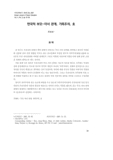

-
 * 본 문서는 배포용으로 복사 및 편집이 불가합니다.
* 본 문서는 배포용으로 복사 및 편집이 불가합니다.
미리보기
서지정보
· 발행기관 : 한국부모교육학회
· 수록지 정보 : 부모교육연구 / 4권 / 2호
· 저자명 : 류정현
목차
I. 연구의 필요성 및 목적
II. 한국적 부모-자녀 관계
III. 가족주의와 부모-자녀 관계
IV. 효(孝)와 부모-자녀 관계
V. 결 론
참 고 문 헌초록
본 연구는 우리나라 문화적 맥락 내에서 나타나는 부모-자녀 관계를 파악하고 한국의 사회문화 전반에 걸쳐 가장 영향을 미치고 있는 유교문화의 특징인 한국적 가족주의(家族主義)와 효(孝)가 부모-자녀관계와 어떠한 관계인지 그리고 어떻게 나타나게 되었는지에 관해 문헌 고찰을 통해서 밝히고자 하는 것이다.
이를 통해 나온 결론은 우리나라의 부모-자녀 관계는 서로가 서로를 하나로 지각하는 특성인 강한 동일체감으로 부모와 자녀가 각각의 개인이 아니라 ‘가족’이라는 전체의 일부분으로 보고 자녀를 부모의 확장으로 생각하는 것이 특징이며, 자녀에 대한 부모의 역할은 아버지의 역할과 어머니의 역할의 차이가 존재하며 이는 서로 상보적이다. 그리고 우리나라의 가치관에 가장 크게 영향을 미쳤다고 할 수 있는 유교는 인간의 가장 기본적인 집단을 가족을 근간으로 구성되었다.
한국적 가족주의와 효는 유교에 바탕을 두고 있는데 가족주의가치관이 우리나라에 널리 인식되면서 우리나라의 가문의 발전과 계승으로 이어져 나가는 역할을 했으며, 효는 부모-자녀 관계 내에서 발생되는 쌍방향적이고 쌍무적인 관계로 낳고 길러준 부모의 사랑(慈)을 자녀가 터득하여 효(孝)로써 실천하는 규범이다.영어초록
This study based on these findings, this paper attempts to analyze an the concepts of parents and children relationship, Familism and Hyo(孝) in Korean society. As a result from the study, we found some unique Korean cultural features in parents-children relationship.
First, Koreans have ‘blood solidarity’ concept between family members. Parents think their children as some kind of their clone(alter ego), not just as independent existence.
Second, traditional Hyo can exist with relation to parents’ labour for nurturing, it is on-sided relationship emphasizing children’s responsibility; the Hyo should be practiced after parents die as well as while parents live.
Finally, traditional Familism based on the confucianism value of “ka(家; meaning of family)” and has placed and emphasis on parents and children. “Familism” which is the central governing principle in Korean families has been related to the individual, the family and the society.참고자료
· 없음태그
-
자료후기
-
자주묻는질문의 답변을 확인해 주세요

꼭 알아주세요
-
본 학술논문은 (주)학지사와 각 학회간에 저작권계약이 체결된 것으로 AgentSoft가 제공 하고 있습니다.
본 저작물을 불법적으로 이용시는 법적인 제재가 가해질 수 있습니다. -
해피캠퍼스는 구매자와 판매자 모두가 만족하는 서비스가 되도록 노력하고 있으며, 아래의 4가지 자료환불 조건을 꼭 확인해주시기 바랍니다.
파일오류 중복자료 저작권 없음 설명과 실제 내용 불일치 파일의 다운로드가 제대로 되지 않거나 파일형식에 맞는 프로그램으로 정상 작동하지 않는 경우 다른 자료와 70% 이상 내용이 일치하는 경우 (중복임을 확인할 수 있는 근거 필요함) 인터넷의 다른 사이트, 연구기관, 학교, 서적 등의 자료를 도용한 경우 자료의 설명과 실제 자료의 내용이 일치하지 않는 경우
“부모교육연구”의 다른 논문도 확인해 보세요!
-
국내 맞벌이 부모 관련 연구의 동향 분석 21 페이지
최근 한국사회의 맞벌이 가족은 점점 증가하여 2006년 현재 43.9%로 보편화된 가족형태가 되고 있다. 이에 따라 맞벌이 부부 및 가족 대상의 전문적인 실천적 지원이 요구되고 있으며, 우선적으로 이를 위한 전반적인 관련연구 동향파악, 실태조사 등이 필요한 실정이다. 그리하여 본 연구는 맞벌이 부부증가에 따라 야기될 수 있는 다양한 현상들을 미리 점검하고 .. -
P.E.T.와 현실요법을 접목한 부모교육 프로그램이 부모의 의사소통기술과 양육태도에 미치는 영향 27 페이지
본 연구의 목적은 부모역할훈련(P.E.T.)과 현실요법의 상담이론을 접목하여 설계한 부모교육프로그램이 부모양육 태도와 의사소통에 어떠한 변화를 가져오는가를 살펴보고자 하였다. 구체적으로 본 연구는 G시에 속한 D 문화센터에서 부모교육 프로그램에 참가한 부모 18명을 대상으로 12주에 걸쳐 주 1회 3시간씩 총 36시간 동안 부모교육 프로그램을 실시하였다. .. -
유아 사고력 프로그램이 개인적 지능에 미치는 효과 24 페이지
본 연구는 사고력 프로그램을 통해서 유아의 개인적 지능 향상에 효과가 있었는지 검증하는데 목적이 있다. 연구대상은 경기도 분당구에 속해 있는 A와 B어린이집 2곳을 선정하여, A어린이집 7세반 19명을 실험집단으로 B어린이집 7세반 15명을 비교집단으로 하고 유아 사고력 프로그램을 실시하였다. 유아 사고력 프로그램은 총 8회기로 이루어져 있으며, 일주일에 .. -
에니어그램 성격유형에 기초한 유아 어머니의 양육태도 척도 개발에 관한 연구 22 페이지
본 연구의 목적은 에니어그램 성격유형에 기초한 어머니용 유아양육태도척도를 개발하는 데 있다. 이 척도는 9가지의 에니어그램 성격유형에 기초하여 제작되었다. 이 척도는 제1유형, 제2유형, 제3유형, 제4유형, 제5유형, 제6유형, 제7유형, 제8유형 및 제9유형의 9가지 요인으로 이루어져 있다. 이러한 연구 목적을 달성하기 위하여 문헌 고찰과 경험적 자료 .. -
위인동화를 활용한 NLPia 코칭 프로그램이 아동의 자아효능감에 미치는 효과 30 페이지
본 연구는 위인동화를 활용한 NLPia 코칭 프로그램이 아동의 자신감, 자아조절효능감, 과제난이도 선호의 자아효능감 향상에 효과가 있는지 검증하는데 목적이 있다. 프로그램 처치 전후의 변화량을 측정하기위해 대응표본 t-test를 이용하여 단일 집단을 대상으로 프로그램 실시 전과 후를 측정하여 비교분석하였다. 위인동화를 활용한 NLPia 코칭 프로그램이 ..
-
정가4,300원
-
지식판매자(주)학지사 P
-
페이지14 페이지
어도비 PDF
-
최초등록일2015.03.24
-
최종저작일2007.01
-
문서 초안을 생성해주는 EasyAI


